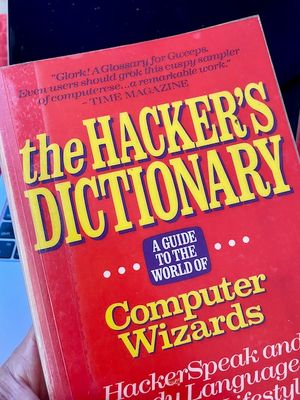Hackers, Crackers, and Cybercriminals
What is a hacker?
I call myself a hacker because I find pleasure in pulling off a neat hack. I also get impressed and inspired by great hackers. But I’m not a criminal and criminals typically don’t impress me. What gives?
A Hack Job
Hacking, as in a hack, has existed in English since around year 1200 and refers to a rough cut, blow, or stroke; a shoddy job in woodchopping or carpentry. The Old English word was haccian.
Hacking took on more of a positive tone when it transferred into handling machines in the 1900s; positive in the sense that a hack was a creative, efficient, quick fix.
Nowadays you see that meaning of the word in things like IKEA Hackers, Lifehacker, and growth hacking although the reputation of the latter has taken a turn for the worse as of late.
A Computer Hack
Hacking computers likewise started out as something positive. The earliest hack I personally heard about were students at my university who in the mid 1970s had limited compute cycles to complete their programming course work. One of them made a mistake and created an infinite loop that consumed the whole class’ compute cycles. They then had to hack the mainframe to get new cycles and complete their assignments.
The first “computer party” I went to was called Hackerence and was just a huge gathering of computer nerds with no lawbreaking in sight beyond copying games. I remember taking the train 270 miles/440 km to go there, carrying an old chunky TV as my monitor.
But slowly as computer crime rose, the term hacker took on more negative connotations. Computer folks tried to fight back but it’s mostly been a losing battle.
The Jargon File and The Hacker's Dictionary
Documentation on computer slang started in the mid 70s in something called the Jargon File. It eventually turned into a book called The Hacker’s Dictionary in 1983. Hacker was defined this way:
hacker [originally, someone who makes furniture with an axe] n. 1. A person who enjoys learning the details of programming systems and how to stretch their capabilities, as opposed to most users who prefer to learn only the minimum necessary. 2. One who programs enthusiastically (even obsessively), or who enjoys programming rather than just theorizing about programming.

The Hacker Manifesto
The eighties also featured the classic Conscience of a Hacker essay published 1986 in the Phrack ezine. Today it’s known as the Hacker Manifesto and its second to last paragraph points to more of an anarchist hacker, someone living outside regular norms:
Yes, I am a criminal. My crime is that of curiosity. My crime is that of judging people by what they say and think, not what they look like. My crime is that of outsmarting you, something that you will never forgive me for.
This mentality is where hacking connected with cyberpunk which really became a thing during that decade.
Crackers and Cybercriminals
The Internet Users’ Glossary from 1993 tries to rein in the bad reputation hacker has gotten and points to another word:
cracker A cracker is an individual who attempts to access computer systems without authorization. These individuals are often malicious, as opposed to hackers, and have many means at their disposal for breaking into a system.
I’d say cracker as defined above is pretty spot on for what many nowadays call a hacker.
But hacker still has an aura of leisure or lack of malicious intent. It doesn’t fit the computer break-ins that organized crime and rogue nation states do. That’s where cybercriminal comes in.
What It Means For Fiction
The word hacker comprises both computer wizards and computer criminals and that’s how I use it in fiction. A hacker can be a hero or a villain and it becomes interesting when both hero and villain are hackers, fighting each other.
This text was originally published in the June 2021 issue of the Hacker Chronicles newsletter. Subscribe below!
Get the Monthly Newsletter
Subscribe to the Hacker Chronicles newsletter and don’t miss out on movie reviews, hacker insights, publishing updates, and research for upcoming books.
Hitting subscribe will take you to the Buttondown service provider which hosts the newsletter. You can also go to subscribe.hackerfiction.email.